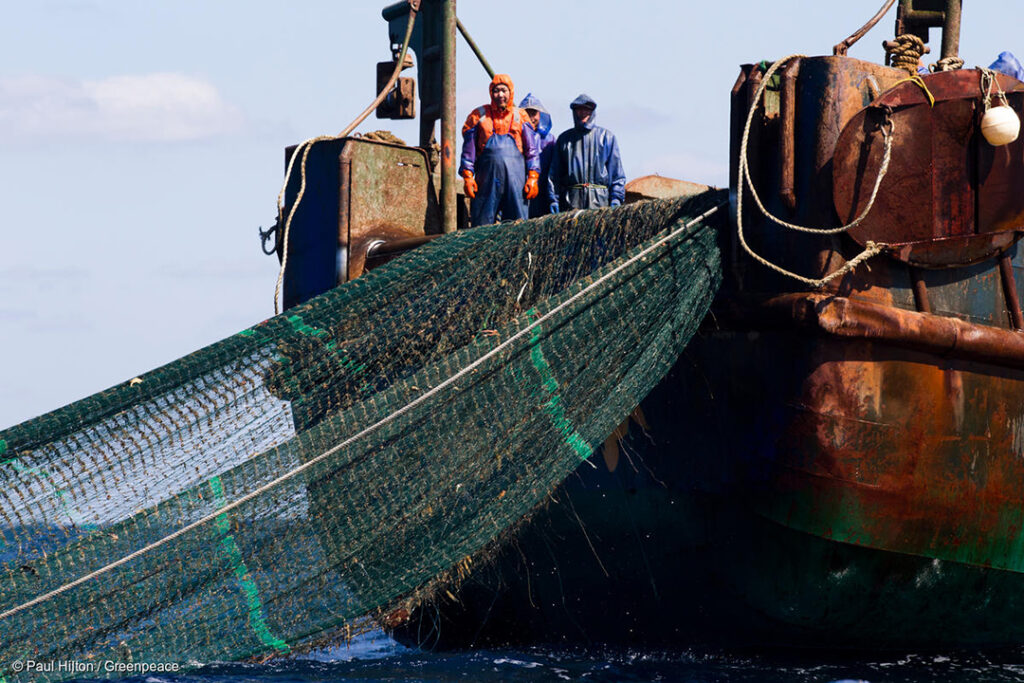ADF STAFF
It is illegal for fishing vessels to discard unwanted fish in Ghanaian waters, but the practice continues, causing waste, environmental degradation and lost income for artisanal fishermen.
According to a recent report by the Environmental Justice Foundation (EJF), captains typically discard juvenile, lower-value fish to make room for more valuable species. Usually targeted by artisanal fishermen, the pelagic fish often are dead when they are thrown overboard.
Fish dumping has increased in Ghana since the country outlawed “saiko,” the illegal transshipment of fish at sea, in 2021.
“[We are] dumping fish too much,” an anonymous crew member of a Chinese trawler told EJF. “Sometimes you can get the fish and the boat will be full, but they will still [haul the net]. Greediness. They want to use us too much, I don’t know — they will throw the net again — they will throw the net and catch plenty of fish after that and dump it all.”
One Ghanaian fisheries observer in 2022 estimated that nearly 50 tons of fish was dumped by a trawler over about 45 days at sea. The EJF says that in Ghana, 90% of illegal fishing boats are Chinese-owned.
Chinese trawlers have committed acts of illegal, unreported and unregulated (IUU) fishing in Ghana and around West Africa for decades. Due to overfishing and other illegal practices, Ghana’s small pelagic fish populations, such as sardinella, have dropped 80% in the past two decades. One species, sardinella aurita, is fully collapsed.
More than 100,000 fishermen and 11,000 canoes operate in the country, but average annual income has dropped by as much as 40% per artisanal canoe in the past 15 years or so, according to the foundation. Illegal fishing also has decimated fish stocks, causing prices to soar and driving food insecurity.
China commands the world’s largest distant-water fishing fleet and is the world’s worst illegal fishing offender, according to the IUU Fishing Index. Of the top 10 companies engaged in illegal fishing globally, eight are from China.
Ghanaian fishermen also told the foundation that industrial trawlers from China and other foreign countries are increasingly fishing in the country’s inshore exclusion zone (IEZ), which is reserved for artisanal fishermen.
The IEZ is meant to provide safe access to fisheries resources, but artisanal fishermen say they often are injured, and their gear gets damaged when industrial trawlers intrude.
“What these trawlers do is that they turn off their lights and make incursions into the IEZ at night,” an anonymous artisanal fisherman told the EJF. “They fish all types of fish including small pelagics. They often make incursions and destroy our fishing gears. This is what I use to feed my family and educate my children. So, if these foreign trawlers destroy my fishing gears, then what will I use to support my family’s livelihood?”
In 2021, Ghana received its second “yellow card” from the European Union for failing to cooperate in the fight against illegal fishing. Ghana’s Fisheries Commission responded by ordering companies operating in the country’s trawl fishing industry to reapply for fishing licenses to continue working in its waters.
In March 2023, Ghana announced that it will try to achieve 100% transparency in industrial fisheries operating within its exclusive economic zone by 2025. To achieve that goal, electronic monitoring systems, or EMS, including video cameras, remote sensors, global positioning systems and hard drives, will be installed on fishing boats to monitor fishing.
“This will contribute to our aim to prevent, deter and eliminate illegal, unreported and unregulated fishing in Ghana,” Mavis Hawa Koomson, Ghana’s minister of fisheries and aquaculture development, said while speaking at the Our Ocean 2023 conference. “This will support our continuing efforts to provide a stable source of employment and livelihood to millions of Ghanaians who rely on our fisheries for domestic and international markets; for this to be sustained we must manage resources responsibly and stop overfishing.”

